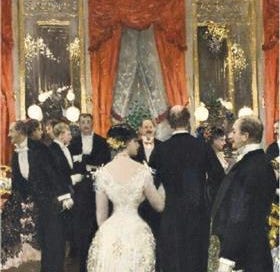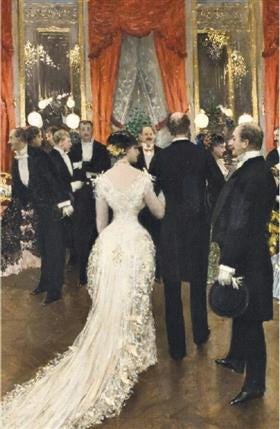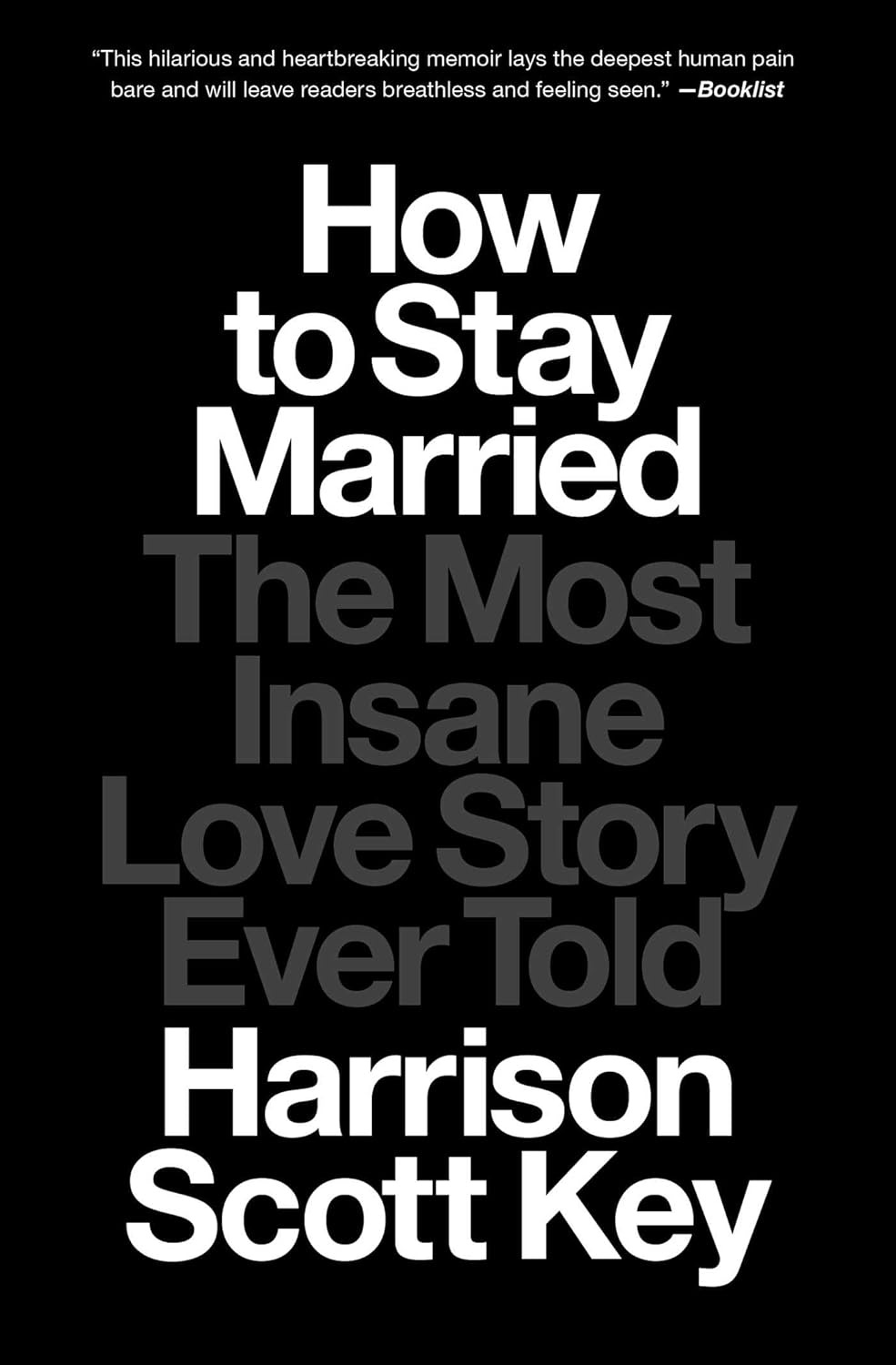As I teased in my last post I recently read Harrison Scott Key’s How to Stay Married: The Most Insane Love Story Ever Told and found it fascinating as a look at what the breakdown and rebuilding of a marriage can look like, but also fascinating to talk about with other people. Is it because we lack cultural touchstones to generate conversation about marriage? Is it because we live in a society that views marriage as personal and almost transactional in nature that it doesn’t necessitate deeper discussion? Or are you all talking about marriage more than I am? All can be possibilities! There has also been a proliferation of divorce memoirs in recent years, going so far back as to the classic of the genre Eat, Pray, Love, that a book about a marriage staying together becomes instantly notable. However, this book depicts a normal marriage from the perspective of a husband choosing to stay with his wife, even after infidelity, through forgiveness, perseverance, and real suffering because of a deep belief in the value of the marriage itself along with their life together as a family.
There are really endless ways to talk about this book, and I will try to constrain myself to a couple today, but I think we have to acknowledge how startling it is to see marriage treated as an indissoluble reality in a traditionally published book. This book is very well written so it really is a no-brainer for a publisher to pick it up, but for marriage to be treated this way by a man who is Christian and as the book goes on, writes more and more about the impact his marriage has on his faith and vice versa is so great to see. These day it does not feel unusual in Catholic circles, let alone Christian circles, for divorce over infidelity to even be questioned. Affairs seem to be the universal line that make divorce understandable and justified to most of us, even those who are traditionally minded and value their faith and lifelong marriage. We don’t want divorce to happen over basic disagreements, but we all seem to carry the understanding that if there has been blatant infidelity the marriage should end. Adultery is a mortal sin! Forgiving such betrayal would be too much to ask. How can you rebuild trust? Even in some Catholic circles it seems that adultery is not discussed very much. I’m not sure if it is because the person committing adultery usually abandons the marriage completely, or if it is because we also feel the burden of being viewed as crazy to pursue a path of forgiveness and rebuilding for our marriages that general society seems to put on married people. Obviously marriage is such an intimate relationship that most of us don’t want to broadcast our marital problems for all to talk about, which is in part what makes this memoir so unique because it is such a intimate view of a marriage that we so rarely see.
I can say that this book has made me think much harder about what I would do in the same circumstances Key finds himself in, and the reflection I see isn’t exactly pretty. I’d love to say that if I were in Key’s shoes I would be able to extend so much mercy in forgiving my spouse, fighting for them, and refusing to walk away from a lifelong commitment I made vows to. But through reading Key’s description of how much he suffered and how difficult daily forgiveness was, I think I can say that I would struggle mightily in making that choice, let alone making that choice for years on end. I am very much one to hold a grudge, my good opinion once lost is lost forever. All of which is to say, I do not judge other people’s marriages. I don’t know what goes on behind closed doors, I don’t understand the depths of another’s woundedness, and while I wish I pursued a canon law degree, I still can’t make decisions about annulments.
That being said, I do think Key exercised heroic virtue in his marriage. We really rarely see ordinary lives lived with extraordinary virtue, although with the saints we are given a peek, but this is a glimpse of someone in real time, in circumstances we can relate to faced with crippling betrayal and what it looks like to actually walk towards reconciliation and forgiveness. I think at every point in the process that he describes in the book of the breakdown and rebuilding of the marriage it would have been easier to choose divorce. He faced so much pain in choosing to stay with someone who so intimately betrayed him, to sleep on the couch every night, to face his own faults and issues he brought to the marriage, to choose to trust each time his wife left the house was immeasurably difficult. To live with someone who so obviously did not want to be with you, who said that they loved someone else would be so horribly hard. It is heroic to forgive someone in such circumstances. And as the book depicts it doesn’t happen romantically or overnight, but over the course of years. Something that only his faith and the love he receives from others can support him through.
Our culture of easy divorce makes other solutions or types of marriages almost nonexistent, and that makes the Catholic understanding of marriage extremely difficult to live out or even imagine. We cannot imagine being unhappy in a marriage, so divorce is the only answer. But what if the Catholic answer is to stay and work on your marriage in the hope of once again finding happiness years down the road? If the marriage is unhealthy but still valid do we even consider the idea of living apart indefinitely? How do we cope with, heal from, and move forward when there has been such damage as adultery within marriage? (Again, with the caveat that there is a valid marriage. And if there is actual abuse then living apart and/or ending the marriage legally should always be pursued, the Church doesn’t want people staying in abusive marriages.)
It just feels like so much has been lost in the discussion of what marriage looks like when it breaks down and not a lot of room for questions or solutions to rebuilding marriages other than divorce. I mean this in terms of generally talking about it. I know that there are so many more resources when it comes to therapy, ministries, and other outreaches that want to help married couples, but as a society, or even a Church do we discuss these topics in a way that can help us deal with these issues when we’re confronted by them in our lives?
Key realizes that the mainstream Protestant church he was attending at the time of his wife’s affair didn’t offer him a lot in terms of understanding forgiveness and his choice to stay married. He desperately needed real support of a small community of friends who would be there with him through the difficulty of day to day life. And while he finds solace in a small church plant where he can play drums during service barefoot, it doesn’t seem to answer the deeper questions of what his suffering means when it comes to his soul, or bringing him closer to the person of Christ. Maybe he decided to make this book more about choosing marriage and not existential questions of eternal suffering, but all our human suffering forces us to go deeper in trying to understand the suffering heart of Christ. We all can choose to see Him more closely, or to stay closer to the surface, usually with more isolation.
The Catholic fullness and understanding of marriage as a Sacrament which itself gives us grace to live out what oftentimes is a lifelong cross is a tough answer for many to swallow. It’s a mystery that feels even more mysterious than marriage. And the longer I’m married the more I begin to see how big the mystery of marriage itself is. I’m deeper into my own marriage than I’ve ever been and sometimes I feel as if I know less than I ever have! It is incredible to think that I made a vow to love one person until one of us dies. It is impossible to think that we can make it work solely based on our human gumption and will, or romantic feelings and perfect sex life. The mystery becomes deeper because we begin to understand how far we have gotten together not by us colliding together through life, but by God’s singular grace in our lives given to us anew each day.
It may seem insane to the world, but love that sacrifices, forgives, and perseveres is what marriage is. How To Stay Married shows us a glimpse of what married love looks like when it is chosen and lived out, even in the face of betrayal and rejection. It’s heroic virtue in ordinary life.
bits:
as a pairing to reading and talking about what life looks like when your marriage is breaking down, I really recommend listening to my dear friend Kendra Tierney Norton’s experience of second marriage after the death of her husband and her thoughts on annulments.
for another podcast where Harrison Scott Key talks more about the book and what it looked like writing this one was a good one to listen to. I appreciated most about hearing how he wouldn’t publish the book if his wife didn’t want him to, and that they both felt it was important to publish to share their story of how to rebuild a marriage.
An impressive and thoughtful call to action from Paul Kingsnorth which I feel really is the must read of the week.
As your top Larry Chapp fan I find it necessary to call your attention to this wonderful podcast interview with Rod Dreher (just hold all your Rod Dreher opinions to the the side for one interview please), I really appreciate the idea of asking God to show himself, something to think about with Advents approach.
reading, watching, what have you:
I couldn’t finish the Goudge St. Francis book. I just could not keep my eyes open and I think she’s a great writer and I love St. Francis and our book club about it was great and obviously I feel guilty!
Finished the new Louise Penny because I am nothing if not the most loyal fan ever. It’s not really a mystery, it’s not even cozy, but dang it if it doesn’t hit the Louise Penny spot. I could write reams about how badly she writes about the Catholic Church (and have! here and here) and this one may be tops in how badly she researches the Church, but it isn’t as offensive as some. I honestly now read these books in quest as to why they work, because structurally as a mystery or crime novel they are just absolute tatters, there is no actual evidence in this book! None! And yet there is 400 pages of suspense. I would love to talk about this in circles for days, please come over for coffee and let this happen.
watching Rivals, do not recommend but lets talk about it.
And that’s it for me. I have been sick for what feels like forever and I am the worst sick person. Probably because I never get sick. So I’ve been miserable and have felt miserable and just want to feel better and get on with my life, but I do need to stop moaning. Hope you’re not sick, and have a lovely weekend!
thanks for nothing vitamin c,
Christy






Really excellent reflection, Christy. I found the book so challenging to think about for many of the same reasons you mention here. It was particularly tough to resist the cultural knee-jerk acceptance of infidelity as a justification for divorce while reading because Key’s wife acted so downright stupidly over and over again. As the story develops we learn this is rooted in some deep family wounds that shed additional light in her weaknesses and motivations, but, ugh.
The writing was brilliant, especially when chapters mirror the structure and style of different parts of scripture. I especially appreciated hearing such a vulnerable sharing of his emotional & spiritual journey as a man/husband/father, which is also rare in media these days. There are a surprising number of Goodreads reviews complaining that the book was too “Jesus-y,” which made me super depressed about our society’s colossal ignorance of scripture, both as a religious text but also its significance as literature. I don’t know what they were expecting, but lots of readers totally missing the entire point of the book, as well as how Key masterfully crafted the story stylistically. Usually I don’t pay much attention to other reviews but this really got under my skin. I kept thinking, “Hello people-Have you never heard of Job or Hosea?!”
I hesitate to say I *enjoyed* this book, because it details a lot of ugly realities of human nature that, for lack of a better phrase, just “feel icky”. While we do need to find more ways to honestly discuss the realities and challenges of marriage in our current culture, it takes immense virtue to do so in a delicate way that doesn’t turn into fatalistic ruminations that ogle at the tragedy of broken marriages and families more than foster hope and encouragement in pursuing that never-ending forgiveness and purification in our relationships. My husband and I recently started participating in the mentor couple program at our parish, and I was surprised at how hard it was to be encouraging without being saccharine and also highlight challenges without being discouraging. We haven’t been married nearly as long as you have, but definitely feeling that the mystery of it all continues to deepen with time. I could go on, but the book offers a lot of food for thought.
So glad you picked up this book and wrote about it and why it's galvanizing. I so appreciate it and you'd have made an excellent canon lawyer. (For so many reasons, this book was needed, is needed, and I hope we keep talking about it. Whether you are on the outside looking in, found yourself on the driveway in a heap with Lauren or on the couch with Harrison, this memoir is for every married, once married, or discerning person. It had me so invested and the dividends are paying off in my own marriage. What a beautiful and real story of redemption and what marriage does and can look like. Brutally funny and gut-wrenchingly honest. My favourite "adult" read this year.